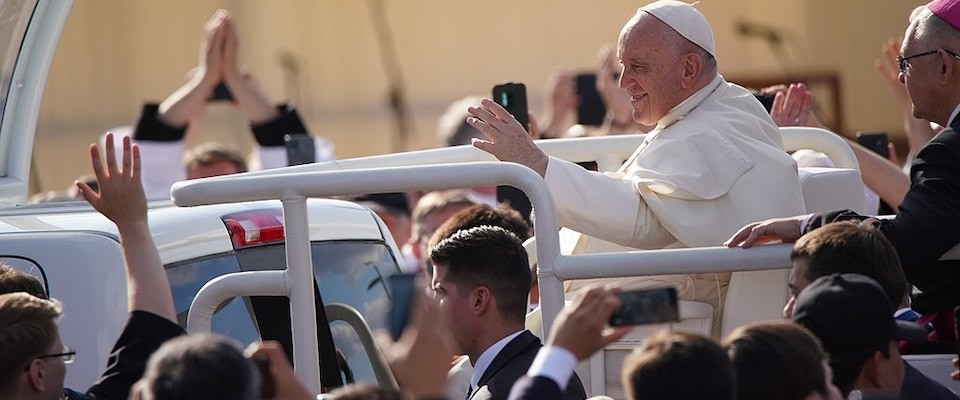THE POPE, SAME-SEX BLESSINGS, AND PROTESTANTS
The confusion surrounding the pope’s recent statement Fiducia Supplicans, a document that is ambiguous about whether Catholic clergy can bless those in same-sex relationships, says much about the times in which we live. Catholic theologians will argue that Rome has not changed, that the fog of distinctions contained in this latest statement means that it does not affect core Roman dogma. But that is not the point: The watching world cares nothing for such sophistry and sees here a fundamental cultural shift. And it seems naive to think that a fundamental change in pastoral practice will not lead to a significant transformation of attitudes. Such compromises—and this is most surely a compromise—always end up being far more sympathetic to the position they are moving toward than that from which they are moving away. When the pope sows chaos within his church on the matter of gay blessings, it is likely to affect us all—Catholic clergy and laity, certainly, but also us Protestants.
For Protestants (and likely many Catholics), this is a reminder that the papacy is not a cure-all for the alleged problems surrounding Protestant notions of scriptural sufficiency and clarity. Saint Paul promoted both the importance of Scripture and a church marked by ordained office for the preservation and transmission of the faith. Neither on its own can do the task by itself, and if Protestantism is vulnerable to not taking the church seriously enough, then a strong and hierarchical ecclesiology is vulnerable to generating its own forms of chaos. The system only has the competence and integrity of its leadership.
It would be easy in such circumstances to indulge in a certain Protestant triumphalism, as many Catholics now seem to face a conflict of conscience akin to that which Luther faced. Yet the problem is that the woes of contemporary Catholicism are not so easily separated from those of contemporary conservative Protestants at this point. Catholicism has for many years given us an umbrella under which we can shelter from the worst excesses of the broader culture. Whether it is the fight against abortion, intrusive health care mandates, or the imposition of political ideology through regulations governing adoption, the Catholic Church has led, and has had the financial power and cultural presence to do so in a way unavailable to Protestants. Strange to tell, she has also been able to maintain with relative impunity some positions that the broader culture finds intolerable among Protestants. Some years ago, my own appointment to the editorial board of an academic journal was almost vetoed because it was discovered that I belong to a denomination that does not ordain women. The objection was only withdrawn when it was pointed out to the complainant that other members of the same board were Catholics and thus members of a church with an all-male clergy.
Most immediately, Fiducia Supplicans will affect the pope's own clergy, who will now come under huge pressure to bless same-sex couples even if their own consciences are troubled or compromised by doing so. Many will no doubt feel some sympathy for Luther at the Diet of Worms, when he stated clearly that it was not safe for a Christian to speak or act against his conscience.
But Catholic clergy will not be the only ones touched by this dilemma. When the leadership is ambiguous on such an important matter, it weakens the position of the laity. What of the public school teacher under pressure to accept the kaleidoscopic identities of the sexual revolution? What about the employee of the software company pressured to do the same? The case of Franz Jägerstätter, so memorably retold in the movie A Hidden Life, is a good, albeit extreme, example of the courage needed by an ordinary Christian when abandoned by a craven, corrupt, and cowardly church leadership. That is the position in which the pope’s latest antics have placed ordinary people—people for whom taking a stand on the truth could cost them far more than it would ever cost the pope. The public school teacher could lose everything. The pope risks only the goodwill of the New York Times editorial column. And if he is not willing to risk that, why should anybody else bother to make a real sacrifice?
This will also affect Protestants. Whether we like it or not, the officer class of our culture cares little for debates about transubstantiation and papal authority. It makes no real distinction between Catholics and Protestants. In its eyes we are all Christians and thus the shenanigans of the pope will put pressure on us all. The argument will be that, if Rome can change, why can we all not change? The possibility of sheltering under that broad cultural umbrella that Rome has provided will be withdrawn on this issue and we will feel the pain of that.
There are two kinds of leaders: those who see their role as remaking their organizations in their own image, regardless of the collateral damage done to those further down the totem pole; and those who seek to protect the interests of the weakest and most vulnerable of those dependent upon them. Throughout his papacy, Francis has presented himself as the latter, but now it would seem that this has been no more than a specious cover for being the former. A good leader speaks with clarity. Francis seems incapable of doing so. And unfortunately, given the high profile of the Catholic Church, the chaos in Rome has implications for Wittenberg and Geneva, too.
Carl Trueman is a professor of biblical and religious studies at Grove City College and a fellow at the Ethics and Public Policy Center.








